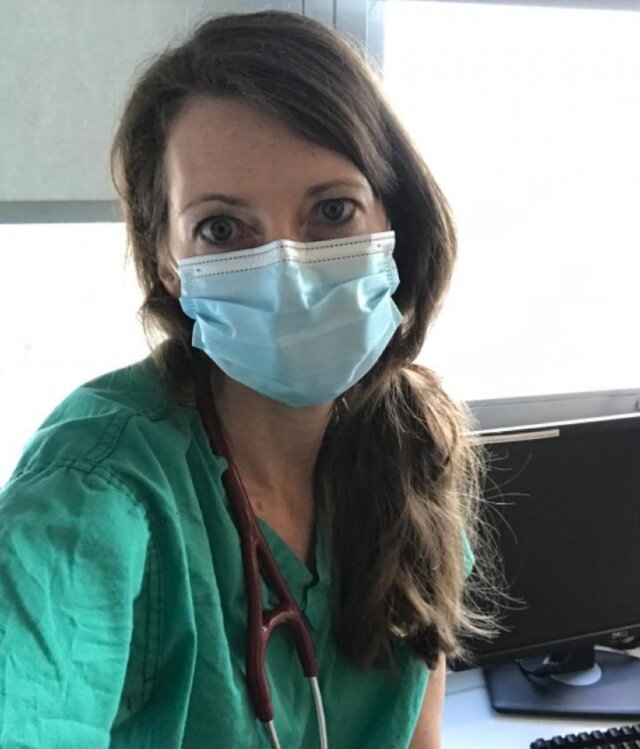Kate Jordan is a scientist, medical doctor, and mother who holds a BA from Colby College, USA, a PhD from Warwick University, UK, and an MBBS from Imperial College, London. Kate is originally from America and currently lives in London, UK with her husband and two small children.
Kate Jordan works as a medical doctor at St George’s Hospital and has been frontline during the Covid pandemic. Dedicated to equal opportunities for women and children, Kate has participated in youth mentoring schemes, was a founding member of the Warwick Women in Science group, and currently represents less than full-time trainee doctors at a local and national level.

It is important to have role models.
Join the Waitlist
Some people find inspiration in gargantuan figures, the titans of a field whose names go down in history. We all know Marie Curie, but we can’t all be her. I would argue that while figures like Madame Curie blaze trails and become pioneers, what is required for the average person to feel that their dreams are tangible is for their presence in a field to be normalised.
The list of female Nobel Laureates in science, engineering, technology, and mathematics (STEM) is short, but fortunately, there is a subtle — but perceivable — shift taking place. Where it was previously 20+ years between women winning a STEM Nobel Prize, there have been seven in the last decade. Marie Curie may be the North Star of Chemistry and Physics, but historically the other stars sharing that sky were men. More and more, as women are recognised for their contributions, those constellations are changing. And that is wonderful. But it is important, perhaps fundamental, that little girls also understand they don’t have to be the best at something to enter the field. Their aspirations are allowed to be as simple as being interested in the subject, and it provides a viable and valuable living (median wage for a STEM career in the US is nearly US$50,000 more than the median annual wage for all other jobs).
A woman should not need to be extraordinary to exist in the same sphere as an average man.
A woman should not need to be extraordinary to exist in the same sphere as an average man. The US labour market is almost equally divided between genders, and while it is impressive that the amount of women in science and engineering (S&E) has doubled in the past 20 years, remarkably women represented only 28% of workers in S&E jobs in 2015. The reasons for this are undoubtedly multifactorial, and there has been a true effort in the past decade to galvanise the field and create opportunity and space for women in the last bastions of old boys’ clubs. True gender equality is more than opportunity though, it is living a life that does not require a woman to have to expend more time, energy, and personal resources to achieve the same outcome as another person born with different sex chromosomes.

The effects of the Covid-19 pandemic over the past year will be felt for decades, and as with all pandemics throughout history - there are certain populations who will bear the brunt of the effects in a more extreme way. With many countries suspending formal education, the phrase “home school” strikes fear in the heart of parents across the globe. While we all love a good WhatsApp rant and a viral video of a mum joking about being at the end of her tether, there is a serious possibility that the pandemic has set women back decades in the employment field. One can only imagine what these mean in science, technology, engineering, and mathematics, where women were already underrepresented.
There has been a multitude of research dedicated to understanding why women fail to enter and/or stay in STEM careers. There are the obvious historic issues of stereotyping, discrimination, and a lack of early support in promoting STEM careers in women at young ages; all of these, one would hope, would be relegated to the annals of a bygone era when society innately thought boys were “good” at science and girls were not. Although such blatantly sexist thinking is now taboo, the more subtle aspects negatively affecting women in STEM still exist. Lack of mentorship, lack of role models, and lack of support for women are pervasive in STEM.
Who do young women look to when they want to define what is possible? And once we achieve accessibility for women in STEM, who do women progressing through their careers look to for support if they want to start families but maintain their careers?
The world has more space and flexibility than perhaps people realise, but historically women have felt guilty asking for adaptations to allow for their life outside of work, and this is becoming ever more problematic. A recent study by McKinsey found mothers are now at least three times more likely than fathers to be meeting the increased homelife demands during the Covid-19 pandemic.
Well-trodden paths create an easy route to follow and breaking away from them can seem insurmountable, or as though we are asking for more than we “deserve”. This is a feeling that is reinforced every time we hear the phrase “work-life balance”. But it is a fear that is entirely unfounded; for example, while asking to work less-than-full-time (LTFT) may feel like asking for time “off”, 75% of LTFT workers have classified themselves as highly motivated, compared to 68% of full-time employees. In the UK, the right to request flexible work is protected by law. Where it is not protected, however, is in our feelings about ourselves and our perceptions of what we contribute.
As we progress through our careers as women it becomes important to focus on what our changing lifestyles enable us to bring to the table, instead of focusing on what we are no longer able to do. Physical availability to be in the lab or the office may be reduced, but ask any mother what she is best at and, without realising it, she is an expert at prioritisation, conflict management, resource utilisation, management, and innovative thinking. Life, by its virtue, provides transferrable skills. We just have to reframe them and recognise them for what they are. And in 2021, the fields that require these skills most are the STEM fields, to enable the world to move forward in the Covid era.
Join the Conversation
Join the waitlist to share your thoughts and join the conversation.
Kate Jordan
Kate Jordan is a scientist, medical doctor, and mother who holds a BA from Colby College, USA, a PhD from Warwick University, UK, and an MBBS from Imperial College, London. Kate is originally from America and currently lives in London, UK with her husband and two small children.
.png)